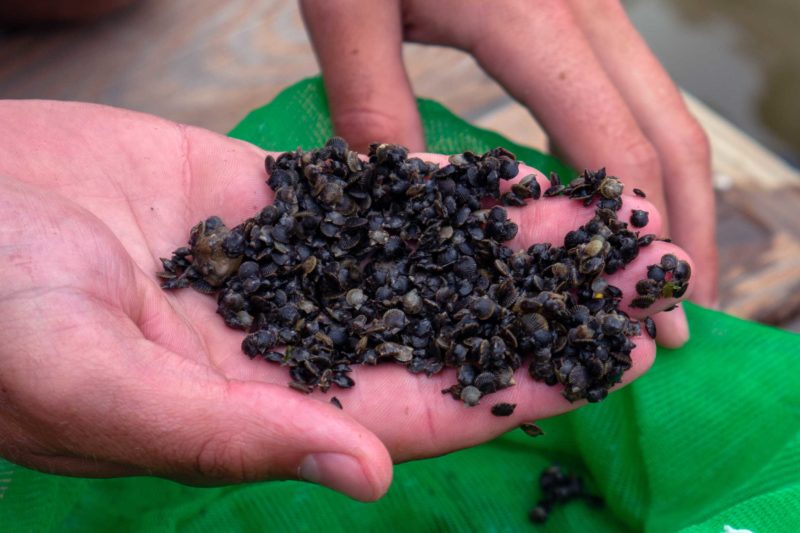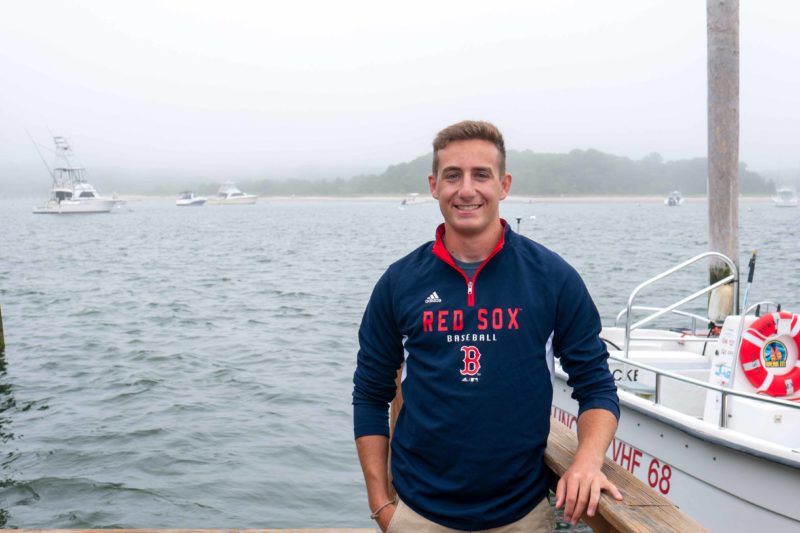Seeding Onset Bay for clean water and healthy shellfish
Adam Veloso steps onto a small floating dock in Onset Bay to check on the creatures in his care. Lifting up a panel of decking, he reaches down into a water-filled tank, unties a green mesh bag and pulls it out of the water to take a closer look.

The Onset Shellfish Project launched its propagation effort with 40,000 scallop seed (seen here) as well as a small quantity of oysters.
From a distance, the bag appears to be full of tiny, black stones. But they are alive and growing—40,000 baby scallops, each tiny shell etched with the scallop’s familiar radiating pattern.
“By the fall, the scallops and the oysters will be ready to move into the Bay. They may spend more time in ‘grow-out’ bags in a protected area, but ultimately they will be released into Onset Bay to expand the shellfish population and be available for recreational shellfishing,” said Veloso, a Dartmouth resident and a junior at Massachusetts Maritime Academy.
The dock, known as an upweller, is the centerpiece of the newly launched Onset Bay Shellfish Project, a pilot program that seeks to draw attention to the importance of the region’s shellfish―the economic and environmental benefits that shellfish provide as well as what’s needed to maintain healthy habitat for the fishery.

The Coalition’s Onset Bay Center partnered with Wareham’s Department of Natural Resources, Mass Maritime, and Woods Hole Sea Grant to launch the effort. Harbormaster Garry Buckminster provided the upweller and advice on its operation; Sea Grant’s Joshua Reitsma has offered guidance on aquaculture and provided instruments to monitor water quality at the upweller site.
“This project is so exciting in that it shines a light on the working waterfront and benefits the Bay at the same time. I’m so grateful to our partners for helping to make this possible,” said Katherine Garofoli, director of the center. “Shellfish play an important role in our region as a sustainable food source and a critical part of the Bay’s food chain and habitat.”
Oysters, quahogs, clams, and scallops contribute to the health of the Bay, acting as natural water filters as they feed on phytoplankton and algae. Mature oysters, for example, may filter as much as 50 gallons of water each day. As part of the project, Veloso and a local high school student will collect water quality readings at the upweller, record the growth of the shellfish seed, and will then share the data with the Woods Hole Sea Grant’s regional shellfish scientific tracking.
At the same time, shellfish are an important food source for a variety of species, from crabs and seabirds to humans. By involving college and high school students in growing the shellfish, the project will provide an opportunity for hands-on learning about the aquaculture industry here in Buzzards Bay and beyond. People who participate in some Coalition programs also will get the opportunity to see the program in action.
This summer, while the scallops and oysters are growing, Onset Bay Center learn to shellfish programs will include a stop at the upweller to discuss how the shellfish grow and their impact on the environment before paddling to Wicket’s Island or Burgess Point. Veloso and other members of the Onset Bay Center staff will lead those sessions.